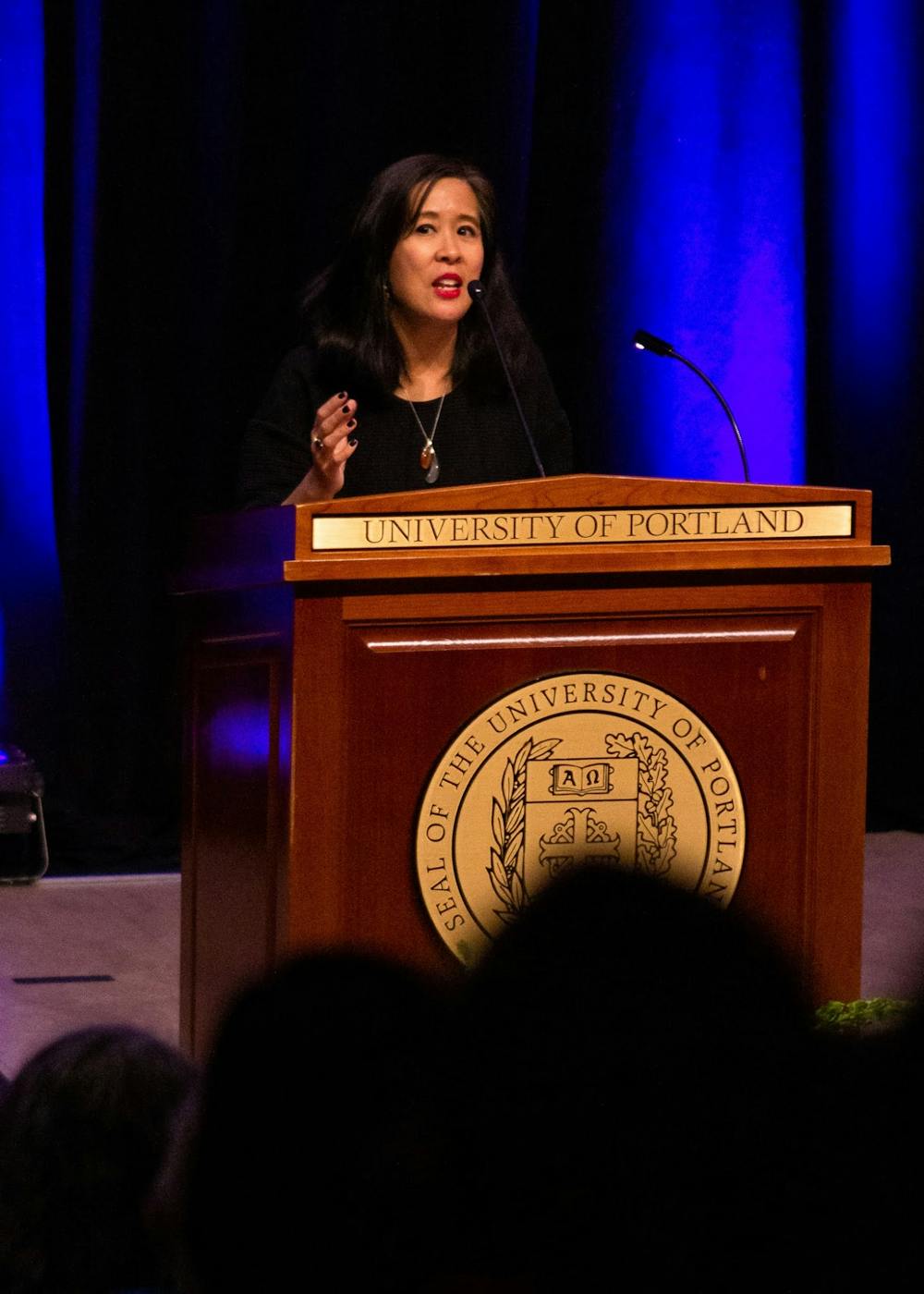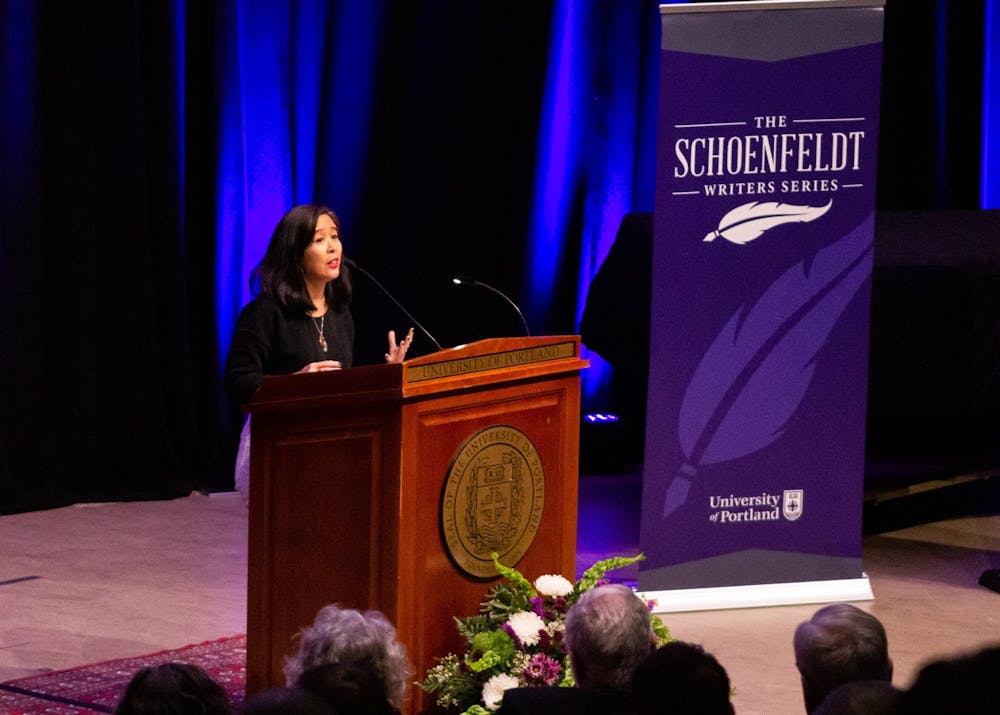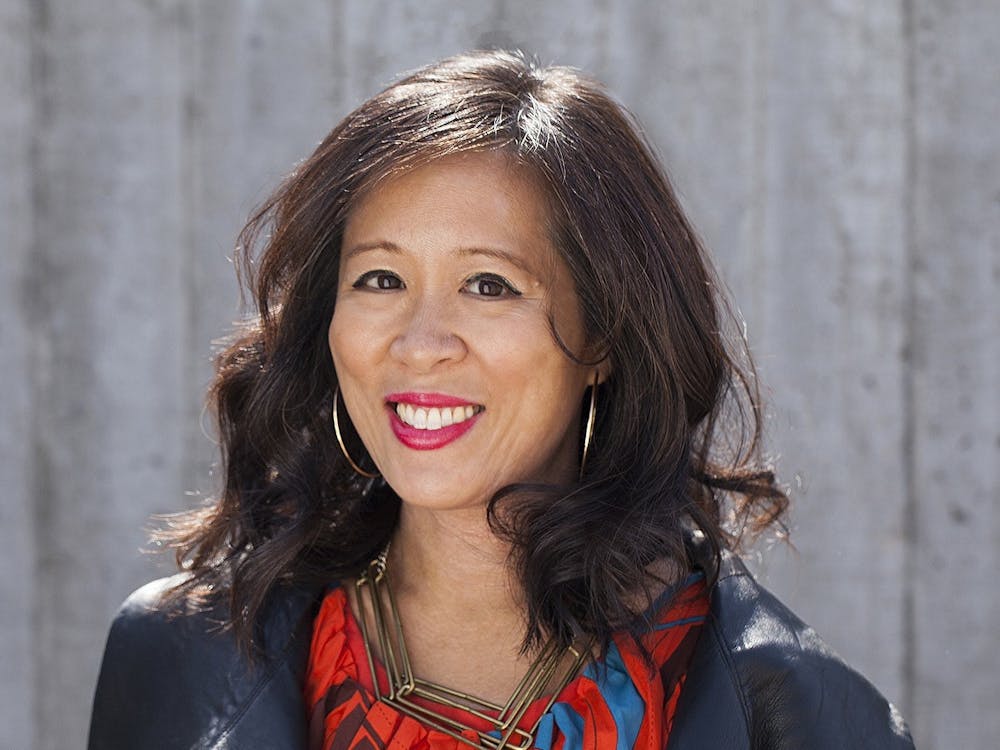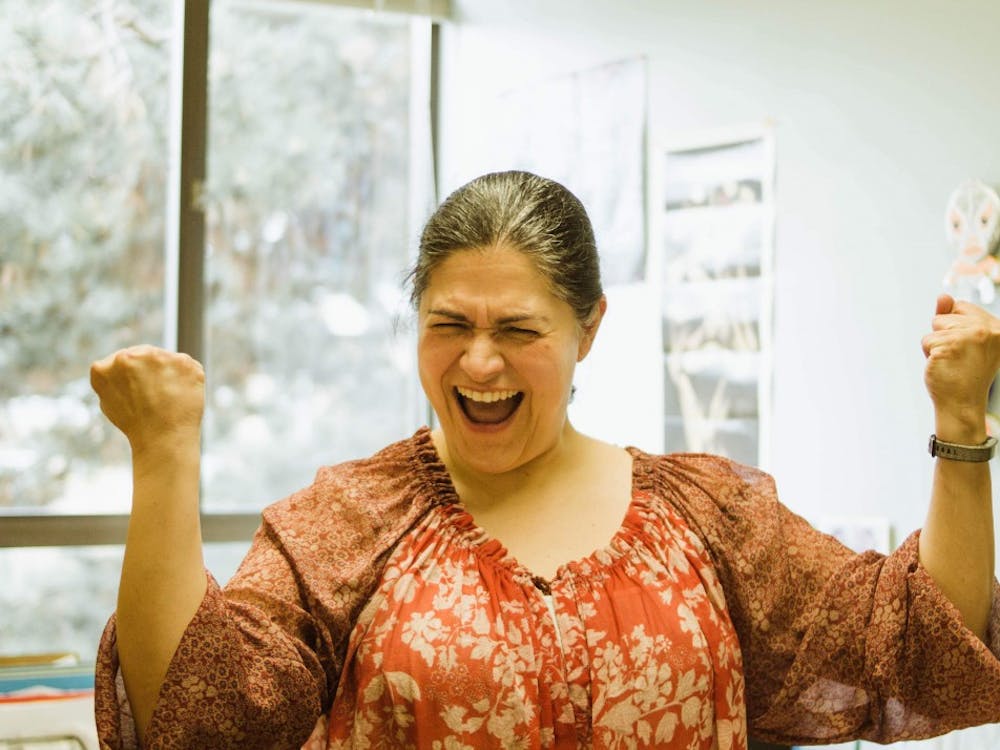Author Lisa Ko wrote her first story at the age of five. It was titled “Magenta the bear goes to college,” with the protagonist named after her favorite Crayola crayon. Since then, she hasn’t stopped writing, and she has documented nearly every day of her life in her journal. Her lifelong writing is also part of the reason why she explains that her book, “The Leavers,” took closer to 40 years to write rather than the seven-and-a-half she officially spent working on it.
“The Leavers” was selected as the sixth annual ReadUP book, and on Monday, Feb. 10, Ko described, in a well attended Buckley Center Auditorium lecture, how the 2016 PEN/Bellwether prize-winning book came to be, what inspires her writing, and political issues highlighted in and surrounding her debut novel.
Ko started writing the book after reading, in 2009, about a Chinese immigrant named Xiu Ping Jiang who was imprisoned in Florida and separated from her son. “The Leavers” focuses on Polly, an undocumented Chinese immigrant working in a Bronx nail salon who disappears suddenly and leaves her 11-year-old son, Deming, behind. Deming is eventually adopted by a white family that changes his name to Daniel, and the novel chronicles his search for Polly.
Below is a selection of quotes from the talk.
On the importance of public libraries to her career
“I’m a writer because I’m a reader, and I’m a reader primarily because I grew up in a town with a public library, and I had a mom who took me there. I often think about how if libraries didn’t exist, it’d be a really hard sell to get them started here in the U.S. This idea of a publicly funded space where people can have books for free. And I also grew up in the ‘80s, so this was before we had the internet. There wasn’t a lot to do back then, except write and watch a lot of bad television.
On the importance of authentic representation in literature
“My parents are Chinese immigrants from the Philippines. Nobody else in my family was a writer, though they might have been if time and circumstances were different. I was the first in my family to be born in North America, and believe it or not, none of my relatives said, ‘We came to this country so you could write stories about made-up people.’ But what my family is, however, are stellar smack-talkers and storytellers and gossips. I grew up hearing, around the dinner table, my parents talk smack about people we knew and better yet, people we didn’t know, so lots of stories about torrid affairs and tragic accidents and everything in between. I like to think of these as kind of my first lessons on narrative and plot. But I didn’t see the people that I heard about in any of the stories I read or tv shows I watched, and now I try to center these people.”
“I said I wanted to be a writer, but I said this only to myself because writers were not people who looked like me or my family. I read all the time, and it wasn’t until I was in middle school that I finally read a book with an Asian American protagonist, and I remember feeling really shocked, actually. I was not used to seeing myself at all in books or in pop culture, or when there was an Asian character, they were usually a target of mockery, so it felt really dangerous to be recognized. But it also made me realize I was worthy of being seen. In all the stories I was reading as a young person, I was mainly seeing white people. You can imagine the psychological impact of that, of not seeing yourself reflected in what you read. I think as young people, we often read to find out who we can be.”
“I knew while I was writing this, I was writing way outside my own experience. I’m not a parent, I’m not an adoptee, I’m not an immigrant, my family’s not from mainland China. There’s a great responsibility to get it right, both on a personal level and on a craft level. On a personal level, I know what it’s like to have my experience misrepresented in literature. On a craft level, I know what it does when people get things wrong...and I also knew that as a writer, procrastination is really well done when you do research. You kind of feel productive without having to confront the page. I ended up speaking to people from foster parents, to transracial adoptees, to online gambling addicts, to New York City musicians, and Fuzhounese immigrants. I read books and articles and interviews, and I ended up traveling to Fuzhou, China.

Lisa Ko, author of the 2020 ReadUP book "The Leavers", speaks to the gathered UP community about the rejection and failure she has faced in her career, the history of family separation in the U.S. and how stories can inspire people to take action.
On rejection and failure in career paths
“In 2015, I decided to play a mind trick on myself and shoot for rejections instead of acceptances. I set this arbitrary goal to get 50 rejections — literary rejections, not personal rejections. I set an Excel spreadsheet, and every time I would get a rejection, I got to mark off and celebrate being one step closer. There was a story that was rejected over 25 times, and I ended up sending it one last time, and that led to it being published in “Best American Short Stories.” There’s a lot to be said about having some healthy delusion and stubbornness to your creative work.”
“(When I was writing “The Leavers”), literally every day I would be like, ‘Why am I doing this? I could be doing so many things.’ But I think at the end of the day, there was really that drive that when I thought of quitting, I would actually feel really sad, and I knew that there was a part of me that wouldn’t want to let it go. This was a story I believed in, I was the person to write this book. I didn’t want someone else to write this book.”
On the history of family separation in the U.S.
“What really struck me about Xiu Ping Jiang’s story was that she had had a young son that she’d tried to bring into the U.S., and he was also caught up with immigration authorities and was adopted by a Canadian family. I couldn’t let this story go. I began to dig more and began to find all these other cases of undocumented immigrants who were being forcibly separated from their U.S.-born children.”
“This story is part of a really long history of family separation here in the U.S. It has used the method of family separation as a way to enact state-sponsored violence. We’ve seen it with enslaved African American families, who had their children taken away from their parents and sold. We saw it with Native American families, where children were taken away to be adopted or forcibly assimilated. We’re seeing it today here on the border of course, with refugee families separated or imprisoned. And of course, within the larger prison system of the U.S., which fractures American families every day.”
“As a daughter of immigrants myself, I’m often feeling a little frustrated with how migration is portrayed as something that’s happening in a vacuum when there’s a much larger context explaining why people seek economic opportunities and safety elsewhere. From the U.S. backing of oppressive governments to wars, to trade agreements, we bomb other countries and we make them untenable to live in, and then we ban refugees from coming into this country from those countries.”
On how stories can spur people to action
“I feel like when I read and hear about these statistics, I often feel very powerless and helpless, so I try to remind myself every day about the work that I can do and how I can take action. I have a handy acronym for it. And I like to think that no social movement exists using one tactic only. There are all things that we can do, in small and larger ways, to make our communities and our country a more just place to live. The acronym that I use is CPR — change, protect, resist. I use them as a baseline for myself every day.
Change — to work to change our own values. Think of ways that we can educate ourselves, the gaps in our own knowledge and understanding. There are many, and I think it’s on purpose, there are definitely many truths and stories that are withheld from us, so I think it’s to think of how to fill those gaps in knowledge and how to look for the stories behind the stories and how to help spread those values to our friends and families.
Protect — to really follow the lead of people affected directly by injustice and to think of the resources that we do have to support. Whether it’s our time, our money, our language skills, our platform, our access to certain resources, is something that can be really useful.
Resist — there are many ways to do this, whether it’s through electoral politics, or talking to elected officials, but most importantly, to just stand up for what we believe is right.”
Dora Totoian is a reporter and the Opinion editor for The Beacon. She can be reached totoian20@up.edu.








